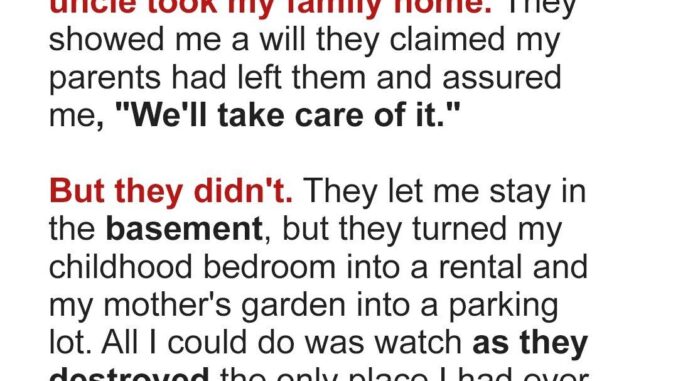
After My Parents Died, My Aunt and Uncle Took My Home and Hid Me in the Basement—Years Later, I Uncovered Their Dark Secret
The day I confronted my aunt and uncle, their faces drained of color. Eight long years of deception collapsed in seconds. They had robbed me of everything—my inheritance, my childhood home, even my parents’ precious memories. But revenge is best served cold and with undeniable proof.
Sometimes, those who promise protection become your greatest threat. I learned this lesson harshly, yet it taught me something valuable: justice can triumph, even against impossible odds.
I was ten years old when my world broke apart. It was a normal Saturday—cartoons playing, a half-eaten bowl of cereal forgotten beside me, and the babysitter, Jenna, distractedly texting.
“They should’ve been home already,” Jenna muttered, glancing anxiously at the clock again.
I shrugged, unbothered. My parents often lingered after grocery shopping, sharing quiet moments at Mom’s favorite café. They deserved it.
The doorbell shattered my peace at exactly 3:42 p.m. I remember because I’d checked the clock, eagerly awaiting the cookies Mom had promised we’d bake together.
It wasn’t Mom or Dad at the door—it was Aunt Margaret and Uncle David, their faces grim. Behind them stood a police officer.
“Amelia, sweetheart,” Aunt Margaret began, her voice trembling as she knelt before me, “something terrible happened.”
The words blurred—car crash, instant death, no suffering. Phrases adults say to cushion the unbearable blow. The funeral passed in a numb haze of black clothes and whispered condolences, strangers telling me how sorry they were, while Aunt Margaret and Uncle David stood by my side, pretending to comfort me.
“You’ll live with us now,” Uncle David promised afterward. “We’ll handle everything.”
“Everything” meant my beloved home—the two-story colonial house where Dad had built my treehouse, where Mom had shown me how to bake her famous cinnamon rolls, and where every Friday night we’d gather for family movies.
But their promise was a lie. They took me to their house and placed me in their basement, calling it my “special space.” It was dark, damp, and smelled of mold and detergent. My bed was an uncomfortable old futon, my clothes hung on a bare metal rack.
Meanwhile, they rented out my childhood home. Mom’s beautiful garden, filled with roses and herbs, was paved over into parking spaces. “It’s financially smart,” Uncle David coldly explained when I cried. “Property is an investment.”
At fourteen, I overheard Uncle David proudly boasting about the rental income. “Best decision we ever made,” he gloated. “The girl has no idea, and property values have doubled.”
That night, I asked about my parents’ will. Aunt Margaret brushed it aside, claiming it was “too complicated” for me. Uncle David scolded, “Your parents would’ve wanted us to be practical.”
So, I stayed silent. For years, I played the obedient niece, expressing forced gratitude during holiday visits. Yet secretly, I watched, waited, and listened.
One day, while cleaning the basement, I discovered a loose floorboard hidden beneath a worn rug. Curiosity drove me to pry it open, revealing an old cloth-wrapped package. Inside lay my parents’ true will, dated just months before their accident, legally signed and witnessed. Everything—house, money, belongings—was supposed to be mine at eighteen, held in trust until then.
My aunt and uncle had lied, stolen my inheritance, and deceived everyone. I kept quiet, knowing I had to be careful. The next day, I confided in my best friend Mia. She gasped, recognizing the gravity. “My mom’s cousin is a lawyer,” she whispered excitedly. “He could help.”
We met Mr. Reeves, a kindly lawyer who confirmed the will was genuine. “When you’re eighteen, you’ll have more power,” he advised. “Gather evidence.”
I followed his advice. Over months, Mia and I secretly collected proof—photos, recorded conversations, and bank statements.
On my eighteenth birthday, Aunt Margaret handed me a cheap card with a twenty-dollar bill tucked inside.
“Could I see the will now?” I casually asked. Uncle David turned hostile immediately. “Why do you care? It’s not yours.”
I smiled calmly. “Actually, I know everything. The forged will, the bribes you paid, your debts. Everything.”
Their expressions darkened. “Who would believe you?” Uncle David snarled. “You have no proof.”
I handed them a stack of papers. They grabbed them eagerly, then recoiled in horror as they read the bold letters: YOU’RE ON CAMERA.
The door swung open, and Mia walked in, recording everything on her phone. “Smile,” I said, pulling a hidden camera from atop the TV. “This goes straight to court.”
They lunged toward me, but Mia held up her phone. “Careful,” she warned. “Assault charges won’t help your case.”
“I couldn’t have done this without you,” I said sincerely. Mrs. Sarah smiled softly, “You did the hardest part—you stood up for yourself.”
That night, lying in my childhood bedroom, I reflected on everything. Losing my parents, the betrayal by family—yet still finding my way home.
I learned that no one has the right to exploit or betray you—not even family. Standing up for your rights can be difficult, but it’s necessary. More importantly, family isn’t defined by blood but by loyalty, courage, and unconditional support—people like Mia and Mrs. Sarah, who stood by me when I needed them most.
Leave a Reply